小学英语期末总复习
小学四年级人教 精通版 上册英语总复习 归纳

小学四年级人教精通版上册英语总复习归纳人教版(精通)四年级英语上册期末总复资料一、26个字母的听说读写二、已掌握的单词Unit 1: 中国 - China,美国 - America,英国 - England,新加坡 - Singapore,加拿大 - Canada,好的 - good,朋友 - friend,兄弟 - brother,姐妹 - sister,男孩 - boy,女孩 - girl,教师 - teacher,农民 - farmer,邮递员 - postman,医生 - doctor,护士- nurse,司机 - driver。
Unit 2: 班级 - class,年级 - grade,一 - one,二 - two,三- three,四 - four,五 - five,六 - six,七 - seven,八 - eight,九 - nine,十 - ten,十一 - eleven,十二 - twelve,十三 - thirteen,十四 - fourteen,十五 - fifteen,十六 - sixteen,十七 - seventeen,十八 - XXX,十九 - XXX,二十 - XXX。
Unit 3: 菠萝 - pineapple,柠檬 - lemon,苹果 - apple,梨 - pear,西瓜 - watermelon,猕猴桃 - kiwi fruit,橙 - orange,香蕉 - banana,土豆 - potato,番茄 - tomato,胡萝卜 - carrot,黄瓜 - cucumber,茄子 - eggplant,青椒 - green pepper。
Unit 4: 晴朗的 - fine,好的 - nice,温暖的 - warm,凉爽的 - cool,炎热的 - hot,寒冷的 - cold,晴朗的 - sunny,多云的 - cloudy,有风的 - windy,下雨的 - rainy,下雪的 - XXX。
2023最新人教版小学一到六年级英语期末复习知识点总结

2023最新人教版小学一到六年级英语期末复习知识点总结小学一至六年级英语期末复习知识点总结一、词汇:1、动词及时态:(1)常见动词的过去式,包括:run-ran, swin-swam, go-went, take-took, come-came, put-put, make-made, find-found, eat-ate, give-gave, have-had, write-wrote, read-read, draw-drew, tell-told, understand-understood等。
2、形容词:(1)有“最”的形容词,比如:the tallest, the most beautiful, the nicest, the most patient等。
(2)有“发音不同”的形容词,比如:big/small, tall/short,thin/thick等。
3、名词:(1)指物的名词,比如:apple, orange, banana, car, bike, book, pencil等;(2)抽象名词,比如:time, people, music, art, education等;(3)地理名词,比如:China, America, United States, Japan, Sydney等;(4)职业名词,比如:teacher, doctor, artist, driver等。
4、代词:(1)人称代词,比如:I, you, we, they等;(2)物主代词,比如:my, your, our, their等;(3)指示代词,比如:this, that, these, those等。
5、冠词:(1)不定冠词a/an;(2)定冠词the,在某些情况下可以省略,如:At weekend.6、介词:(1)时间介词,比如:in, on, at;(2)地点介词,比如:to, from;(3)方式介词,比如:by, with;(4)其他介词,比如:of, for, like, under, behind等。
六年级英语总复习资料

六年级英语总复习资料作为小学六年级的一名学生,英语学习难免是必不可少的一部分。
在这六年的学习过程中,我们学习了很多知识,掌握了很多技能。
但是,在即将到来的期末考试中,我们还需要进行全面的复习。
本文就来总结一下六年级英语的复习资料。
听力在听力方面,我们需要着重练习两个方面:语音和对话。
对于语音方面,可以多听英文歌曲,模仿歌曲中的英式发音。
对于对话方面,则可以多听英语对话,认真听懂对话内容,并理解其中的语法结构和语境。
语法语法是英语学习中的重要部分,需要学生们多做练习。
对于重要的语法知识点,如一般现在时、一般过去时、不规则动词变化等,可以多做练习题巩固。
此外,学生们还需要深刻理解时态的用法,以及宾语、补语等语法结构的使用。
阅读理解阅读理解是六年级英语中比较重要的部分。
学生们需要多读英语故事、新闻报道等文章,多做阅读理解题巩固理解能力。
在阅读时,学生们需要注意提高自己的阅读速度和理解能力,能够快速找到关键词并理解文章中的主旨。
写作英语写作是六年级英语学习中比较重要的部分。
学生们需要掌握各种句型和表达方式,并能够流利地写出自己的想法。
在写作过程中,学生们需要注意语法和用词准确、清晰,同时要注意表达自己的观点,用简洁明了的语言表达。
词汇词汇是英语学习中的基础,学生们需要掌握一定的词汇量,并能够正确使用所学的单词和短语。
为了增加词汇量,学生们可以通过看英文原版书籍、听英文广播等方式进行提高。
综上所述,六年级英语复习资料包括听力、语法、阅读理解、写作和词汇等部分。
通过集中精力、刻苦学习,我们一定能够在期末考试中取得好成绩。
小学英语总复习资料完整版

小学英语总复习资料完整版文稿归稿存档编号:[KKUY-KKIO69-OTM243-OLUI129-G00I-FDQS58-小学期间重要词汇:学习用品(school things):pen钢笔pencil铅笔pencil-box铅笔盒ruler尺子book书bag包 schoolbag书包eraser 橡皮 crayon 蜡笔comicbook漫画书postcard明信片newspaper报纸storybook故事书notebook笔记本Chinesebook语文书Englishbook英语书mathbook数学书magazine杂志dictionary词典人体(body):foot脚head头face脸hair头发nose鼻子mouth嘴eye眼睛ear耳朵arm 手臂hand手finger手指leg腿tail尾巴颜色(colours):red红blue蓝yellow黄green绿white白black黑pink粉红purple紫orange橙brown棕动物(animals):cat猫dog狗pig猪duck鸭rabbit兔horse马elephant大象ant蚂蚁fish鱼bird鸟snake蛇mouse老鼠(mice 复数)monkey猴panda熊猫bear熊lion狮子tiger老虎fox狐狸zebra斑马deer鹿giraffe长颈鹿goose鹅hen母鸡turkey火鸡lamb小羊sheep绵羊goat山羊cow奶牛人物(people):friend朋友boy男孩girl女孩mother(mum)母亲father(dad)父亲sister 姐妹brother兄弟uncle叔叔;舅舅aunt姑姑 man男人woman女人Mr.先生Miss小姐lady女士;小姐parents父母grandparents祖父母grandma/grandmother(外)祖母grandpa/grandfather(外)祖父cousin堂(表)兄弟;堂(表)姐妹son儿子daughter女儿baby婴儿kid小孩classmate同学penpal笔友tourist旅行者people人物robot机器人职业(jobs):teacher教师student学生doctor医生nurse护士cook 厨师 driver司机farmer农民singer歌唱家writer作家actor男演员actress女演员artist画家TVreporter电视台记者engineer工程师cleaner清洁工basketballplayer篮球运动员factory worker 工厂工人 postman 邮递员 businessman 商人 post officer 警察fisherman 渔民 scientist 科学家 pilot 飞行员 coach 教练食品,饮料(food&drink):rice米饭bread面包beef牛肉milk牛奶water水egg蛋fish 鱼tofu豆腐cake蛋糕hotdog热狗hamburger汉堡包Frenchfries炸薯条cookie曲奇biscuit饼干jam果酱noodles面条meat肉chicken鸡肉pork猪肉mutton羊肉vegetable蔬菜salad沙拉sandwich 三明治soup汤ice冰ice cream冰淇淋Coke可乐juice果汁tea茶coffee咖啡breakfast早餐lunch午餐dinner/supper晚餐meal一餐水果,蔬菜(fruit&vegetables):apple苹果banana香蕉pear梨orange橙watermelon西瓜grape葡萄eggplant茄子greenbeans青豆tomato西红柿potato土豆peach桃strawberry草莓onion洋葱carrot胡萝卜cabbage卷心菜衣服(clothes):jacket夹克衫shirt衬衫T-shirt丅恤衫skirt短裙子dress连衣裙jeans牛仔裤pants长裤socks袜子shoes鞋子sweater毛衣coat上衣shorts短裤hat(有沿(de))帽子cap便帽sunglasses太阳镜tie领带scarf围巾gloves手套umbrella 雨伞 cloth布交通工具(vehicles):bike自行车bus公共汽车train火车boat小船ship轮船car小汽车taxi出租车plane飞机subway地铁on foot 步行杂物(otherthings):window窗户door门desk课桌chair椅子bed床computer计算机blackboard黑板fan风扇light灯teacher'sdesk讲台picture图画;照片wall墙壁floor地板football/soccer足球phonesofa沙发fridge冰箱table桌子TV电视key钥匙photo照片plate 盘子bowl碗knife刀fork叉spoon勺子chopsticks筷子gift礼物toy玩具key 钥匙 map地图ball球balloon气球kite风筝box盒子umbrella伞violin 小提琴menu菜单e-mail电子邮件trafficlight交通灯money钱medicine药地点(locations):home家room房间bedroom卧室bathroom卫生间livingroom起居室kitchen厨房classroom教室school学校park公园library图书馆postoffice邮局policeoffice警察局hospital医院cinema电影院bookstore书店farm农场zoo动物园办公室library图书馆gym体育馆bathroom卫生间artroom绘画教室computerroom计算机教室musicroom音乐教室TVroom电视机房company公司factory工厂petshop宠物商店naturepark自然公园themepark主题公园sciencemuseum科学博物馆theGreatWall长城supermarket超市 restaurant餐馆bank银行country国家village乡村city城市hometown家乡busstop公交车站课程(classes):Chinese class语文math class数学PE class体育课English class英语课music class 音乐课 art class 美术课国家,城市(countries&cities):China中国America/USA美国UK联合王国England英国Canada加拿大Australia澳大利亚NewYork纽约London伦敦Sydney悉尼Moscow莫斯科气象天气(weather):cold寒冷(de)warm温暖(de)cool凉爽(de) hot 热(de)snowy下雪(de)sunny晴朗(de)rainy下雨(de)windy有风(de)cloudy多云(de)weatherreport天气预报景物(nature):river河流lake湖泊forest森林road公路house房子bridge桥building建筑物rain雨cloud云sun太阳mountain山 hill 小山sky天空rainbow彩虹wind风air空气moon月亮植物(plants):flower花grass草tree树plant植物rose玫瑰leaf叶子星期(week):Monday星期一Tuesday星期二Wednesday星期三Thursday星期四Friday星期五Saturday星期六Sunday星期天weekend周末月份(months):Jan.(January)一月Feb.(February)二月Mar.(March)三月April四月May 五月June六月July七月Aug.(August)八月Sept.(September)九月Oct.(October)十月Nov.(November)十一月Dec.(December)十二月季节(seasons):spring春summer夏fall/autumn秋winter冬方位(directions):south南north北east东west西turn left(at)左边 turn right(at)右边go straight 直走患病(illness):haveafever发烧hurt疼痛haveacold感冒数词(numbers):one一two二three三four四five五six六seven七eight八nine九ten十eleven十一twelve十二thirteen十三fourteen十四fifteen十五sixteen十六seventeen十七eighteen十八nineteen十九twenty二十thirty三十forty四十fifty五十sixty六十seventy七十eighty八十ninety九十forty-two四十二hundred百one/ahundredandthirty-six一百三十六first第一second第二third第三fourth第四fifth第五eighth第八ninth第九twelfth第十二twentieth第二十thirtieth第三十形容词(adj.):big大(de)small小(de)long长(de)tall高(de)short短(de);矮(de)young年轻(de)old旧(de);老(de)strong健壮(de)friendly 有好(de)thin瘦(de)fat胖(de) active积极活跃(de)quiet安静(de)nice好看(de)kind和蔼亲切(de) polite 有礼貌(de) hard-working 工作努力(de) shy 害羞(de)strict严格(de)clever聪明(de)funny滑稽可笑(de)tasty好吃(de)sweet甜(de)salty咸(de)sour酸(de)fresh 新鲜(de) hot 辣(de) delicious 美味(de)favourite最喜爱(de)clean干净(de)tired疲劳(de)angry生气(de) happy高兴(de)sad忧愁(de)good好(de)fine好(de)great很好(de)heavy重(de)new新(de)happy快乐(de)right对(de)hungry饥饿(de)thirsty 渴(de)cute逗人喜爱(de)little小(de)lovely可爱(de)beautiful漂亮(de)colourful色彩鲜艳(de)pretty漂亮(de)cheap便宜(de)expensive昂贵(de)juicy多汁(de)tender嫩(de)healthy健康(de)ill有病(de)helpful有帮助(de)high高(de)easy简单(de)proud骄傲(de)taller更高(de)shorter更矮(de)stronger更强壮(de)older年龄更大(de)younger更年轻(de)bigger更大(de)heavier更重(de)longer更长(de)thinner更瘦(de)smaller更小(de)better更好(de)(good 和well (de)比较急higher更高(de)介词(prep.):in在……里on在……上;在……时候under在……下面near在……(de)旁边behind在……后边nextto与……相邻over在……上面infrontof在……前面above 在……上面 between 在……中间 beside 在旁边动词(v.):get(gets, got) up 起床 go(goes, went) to school去上学 go home 回家go to bed 上床睡觉 wash( washes, washed)my clothes 洗我(de)衣服 watch( watches, watched)TV 看电视 do(does, did) homework 做作业 read(reads, read) books 看书play( plays, played)踢足球 play basketball 打篮球 play ping-pong 打乒乓球play badmiton 打羽毛球 play the pipa 弹琵琶 do kungfu 练功夫 draw(draws, drew) cartoons 画漫画 cook(cooks, cooked)烹饪 swim( swims, swam) go swimming 游泳speak(speaks, spoke) English 说英语 eat(eats, ate) breakfast 吃早饭 have(has, had)…class 上……课 play sports 进行体育运动 do morning exercises 做早操 eat dinner 吃晚饭 clean(cleans, cleaned) my room 打扫我(de)房间 go for a walk 散步go shopping 去购物 take(takes, took) a dancing class 上舞蹈课 go on a picnic去野餐 pick(picks, picked) apples 摘苹果 make(makes, made) a snowman 堆雪人turn(turns, turned) left 向左转 turn right 向右转 slow down 慢下来 stop(stops, stopped)停下 visit(visits, visited) my grandparents 拜访我(de)外祖父母see(sees, saw) a film 看电影 take a trip 去旅行 go to the supermarket 去超市cook Chineses food 做中国菜 study(studies, studied) Chinese 学习中文 do word puzzles 猜字谜 go hiking 去远足see a doctor 看医生 do more exercise 做更多(de)锻炼 wear(wears, wore) warm clothes 穿厚点 take a deep breath 深呼吸 count toslept) 睡觉 go camping 野营 go fishing 去钓鱼 ride(rides, rode) a horse 骑马hurt(hurts, hurt) my foot 伤了脚 take pictures 照相 buy(buys, bought) gifts 买礼物 go cycling 骑自行车 ice-skate = go ice-skating =go skating 滑冰小学期间重要句型特殊疑问句Where are you from 你是哪里人I’m from the UK. 我是英国人.Where is my pencil box 我(de)铅笔盒在哪It’s in your desk. 在你(de)桌子里. Where is it 它在哪It’s near the window. 就在窗户旁边.Where are the keys 钥匙在哪Where is the teachers’ office 教师(de)办公室在哪里It’s on the second floor. 它在二楼.Where is the museum shop 博物馆商店在哪里It’s near the door. 在大门附近. Where are you going 你们打算去哪We’re going to the cinema. 我们打算去电影院. Where does he work 他在哪工作 He works at sea. 他在海上工作.Where did you go 你去了哪里Who’s that man 那位男士是谁He’s my father. 他是我(de)爸爸.Who’s he 他是谁Whose coat is this 这是谁(de)外套It’s mine. 它是我(de).Whose pants are those 那条裤子是谁(de) They are your father’s. 它们是你爸爸(de).Whose is it 这是谁(de) It’s Zhang Peng’s. 是张鹏(de).What’s your/his name 你叫什么名字My/His name’s John. 我叫约翰.What’s this/that 这/那是什么It’s a duck. 它是只鸭子.What are these/those 这些/那些是什么They’re tomatoes.What’s in your schoolbag 你(de)书包里有什么What colour is it 什么颜色(de) It’s blue and white. 是蓝白色(de).What’s for dinner 晚餐吃什么What would you like 你想吃什么I’d li ke (I would like)some soup and bread. 我想要汤和面包. What would you like to eat 你想吃什么 A sandwich, please. 请给我一个三明治. What would you like to drink 你想喝什么I’d like some water. 我想喝点水.What’s your favourite food 你最喜欢吃什么食物Noodles. They’re delicious. 面条.面条很好吃.W hat’s your aunt’s job 你婶婶做什么工作She’s a nurse. 她是为护士.What tiime is it 几点了It’s 6 o’clock. 六点了.What’s the weather like in New York纽约天气怎么样It’s rainy. 是下雨天.What are they doing 他们在干什么They’re eating lunch. 他们在吃午饭. What’s the little monkey doing 那只小猴子在干什么It’s playing with its mother. 它在和妈妈玩耍. What’s he like 他什么样He’s kind. 他很和蔼. What do you have on Thursdays 星期四你有什么课 I have math, English, and music.What can you do for the party, children 孩子们,你们能为联欢会做什么呢I can sing English songs. 我会唱英语歌.What are you going to do tomorrow 你明天打算做什么I’m going to have an art lesson. 我要上美术课.What are Peter’s hobbies 彼得有什么爱好 He likes reading stories. 他喜欢读故事.What does he do 他是做什么(de) He’s a businessman. 他是商人.What’s wrong(with+某人) (某人)怎么了 Your father is ill. 你爸爸病了. What did you do last weekend 你上周末干了什么 What happened 怎么了How are you 你好吗I’m fine, thank you. 我很好,谢谢你.How old are you 你几岁了I’m six years old. 我六岁了.How many plates (你要)几个盘子How many kites do you see 你看见了多少只风筝How many crayons do you have 你有多少只蜡笔How many people are there in your family, Chen Jie 你家有几口人,陈洁My family has six people. 我家有6口人.How do you like this skirt 这条短裙你觉得怎么样It’s very pretty. 它很漂亮. How much is this skirt 这条短裙多少钱It’s $89. 它89美元.How do you come to school 你怎么来学校(de) Usually, I come on foot. 通常我走路来.How does he go to work 他怎么上班 He goes to work by bike. 他骑自行车上班. How tall are you 你多高I’m 1.65 meters. 我身高1.65米.How heavy are you 你多重I’m 48kilograms. 我体重48公斤.How was your weekend 你周末过得怎么样 It was good, thank you. 很好,谢谢.How did you go there 你们怎么去(de) We went there by plane. 我们坐飞机去(de). How do you know that 你怎么知道(de)When is the party 聚会在什么时候It’s in April. 在4月.When is the trip this year 今年(de)秋游在什么时候It’s in October. We’ll go to the Great Wall. 在10月. 我们将去长城.When is April Fool’s Day 愚人节是哪天It’s on April 1st. 它在4月1日.When is your birthday 你(de)生日是哪天 My birthday is on April 4th .When are you going 你们什么时候去When do you finish class in the morning 你们上午(de)课几点结束We finish class at 1 o’clock. 我们1点钟结束上午(de)课.Which season do you like best = What’s your favourite season 你最喜欢(de)季节是什么Winter.= I like winter. =I like winter best. = winter is my favourite season. Why 为什么 Because I like summer vacation. 因为我喜欢暑假.一般疑问句Is she your mother 她是你(de)妈妈吗 Yes, she is. 是(de),她是. No, she isn’t. 不,她不是.Is it in your bag 在你(de)包里吗No, it isn’t. 不,没有在我包里.Is she in the living room 她在客厅里吗No, she isn’t. 不,她不在.Is this the teachers’ office 这是教师办公室吗No, it isn’t. The teachers’ office is next to the library. 不,不是.教师办公室挨着图书馆.Is that the computer room 那是计算机房吗Is it cold 天冷吗No, it isn’t. 不,不冷.Is he young 他年轻吗No, he isn’t. 不,他不年轻.Is he drinking water 它在喝水吗No, he isn’t. He’s eating. 不是.它在吃东西. Is there a river in the forest, Miss White 怀特小姐,森林里有河吗No, there isn’t.不,森林里没有河.Are there any tall buildings in the nature park 自然公园里有高楼吗No, there aren’t. 不,自然公园里没有高楼.Are they on the table 它们在桌子上吗No, they aren’t. They’re in the door. 不,不在.它们在门上.Are these carrots 这些是胡萝卜吗 Yes, they are. 是(de).Are they hens 它们是母鸡吗No, they aren’t. They’re ducks. 不,不是.它们是鸭子.Are these yours 这(双鞋)是你(de)吗No, they aren’t. 不,不是.Are these all ours 这些都是我们(de)吗Can I have some water, please 请给我些水好吗Can I go outside now 现在我能出去吗Yes, you can. / No, you can’t. 可以/不可以.Can I try them on 我能试试吗Can you do any kung fu, Jhon 约翰,你会武术吗 Yes, I can. 是(de),我会武术. Could you see stars at night 在晚上你可以看到星星吗 Yes, I could. 可以.Would you like a knife and fork 你想要刀和叉吗 Yes, please.Do you like oranges 你喜欢橙子吗Yes, I do./ No, I don’t. 是(de),我喜欢./不,我不喜欢.Do you have a library 你们有一个图书馆吗 Yes, we do. 是(de),有.Do you often read books in the park 你经常在这个公园里看书吗No, I don’t. 不, 我不经常在这里看书.Does he live in Sydney 他住在悉尼吗No, he doesn’t. 不,他没有.Does he like doing word puzzles and go hiking 他喜欢猜字谜和远足吗Yes, he does. 是(de),他喜欢.Did you do anything else 你还做了其他什么事吗Yes, I cleaned my room and washed my clothes. 是(de),我到扫了房间,还洗了衣服. Did you see a film 你看电影了吗No, I had a cold. I stayed at home all weekend and slept. 没有,我感冒了.整个周末都待在家睡觉.Did you go to Turpan 你们去吐鲁番了吗Yes, we did./ No, we didn’t. 是(de),我们去了./ 不,我们没去.陈述句It’s so tall 它好高啊 Come here, children 到这里来,孩子们I have a ruler/ an eraser. 我有一把尺子/ 一块橡皮.It has a long nose. 它有长鼻子. It has small eyes and big ears. 它有小眼睛和大耳朵.We have a new classroom. 我们有间新教室.He has glasses and his shoes are blue. 他戴眼镜,穿蓝色(de)鞋子.My family has six people. 我家有6口人.I can use chopsticks. 我会用筷子.It’s time for breakfast/English class. 是时候吃早饭了/上英语课了.It’s time to go home/get up. 是时候回家/起床了.It’s cold outside. 外面冷. It’s rainy. 是下雨天. It’s 26 degrees. 是26度.There is a big bed. (这里)有一张大床.There are so meny pictures here. 这里有这么多幅画.There was no library in my old school. 我以前(de)学校没有图书馆.There were no computers or Internet in my time. 我那时候没有电脑也没有网络. The yellow picture is mine. 那副黄颜色(de)画是我(de).In the USA people on bikes must wear one. 在美国骑自行车(de)人必须戴(头盔 a helmet).I must pay attention to the traffic nights. 我必须注意交通信号灯.We are going to draw some pictures in Renmin Park. 我们要到人民公园去画画. They are afraid of him. 它们害怕它.The cat is angry with them. 这只猫很生它们(de)气.He should see a doctor this morning. 他今天早上应该去看医生.That’s the tallest dinosaur in this hall. 那是这个厅里最高(de)恐龙.It’s taller that both of us together. 它比我俩加起来还高.I want to buy the new film magazine. 我想买期新(de)电影杂志.Before, I was quiet. Now, I’m ver y active in class. 以前,我很安静.现在我在课堂上很活跃.I was short, so I couldn’t ride my bike well. Now, I go cycling every day.我以前个子小,自行车骑不好.现在我天天骑车.I don’t like grapes. 我不欢葡萄.Me, neither. 我也不喜欢.(祈使句)Look at me 看我Have a good time 玩开心点儿Have some bread. 吃点面包吧.Talk quietly. 小声讲话.Keep your desk clean. 保持桌面整洁.Open it and see 打开看看Tell us about your school, please. 请给我们讲讲您(de)学校吧.Let’s go home 我们回家吧Honey, let’s buy some fruit. 宝贝儿, 我们买点水果吧.Let’s go to school 我们一起回家吧Let’s make a puppet (让)我们一起做个木偶吧Let’s go and se e 我们去看看吧Let’s clean the classroom 我们打扫教室吧Let me clean the windows. 我来擦窗户.Don’t go at rhe red light 别闯红灯Don’t be sad. 别伤心.Sounds great 听起来不错Silly me 我真傻时间名词前所用介词(de)速记歌年月周前要用in,日子前面却不行.遇到几号要用on,上午下午又是in.要说某日上下午,用on换in才能行.午夜黄昏须用at,黎明用它也不错.at也用时分前,说“差”可要用上to,说“过”只可使用past,多说多练牢牢记,莫让岁月空蹉跎.小学英语语法复习要点一、名词复数规则1.一般情况下,直接加-s,如:book-books, bag-bags, cat-cats, bed-beds2.以s. x. sh. ch结尾,加-es,如:bus-buses, box-boxes, brush-brushes,watch-watches3.以“辅音字母+y”结尾,变y为i, 再加-es,如:family-families, strawberry-strawberries4.以“f或fe”结尾,变f或fe为v, 再加-es,如:knife-knives5.不规则名词复数:man-men, woman-women, policeman-policemen, policewoman-policewomen, mouse-micechild-childrenfoot-feet,.tooth-teethfish-fish, people-people,Chinese-Chinese, Japanese-Japanese二、一般现在时一般现在时基本用法介绍No. 1一般现在时(de)功能1.表示事物或人物(de)特征、状态.如:The sky is blue.天空是蓝色(de).2.表示经常性或习惯性(de)动作.如:I get up at six every day.我每天六点起床.3.表示客观现实.如:The earth goes around the sun.地球绕着太阳转.一般现在时(de)构成1. be动词:主语+be(am,is,are)+其它.如:I am a boy.我是一个男孩.2.行为动词:主语+行为动词(+其它).如:We study English.我们学习英语.当主语为第三人称单数(he, she,it)时,要在动词后加"-s"或"-es".如:Mary likes Chinese.玛丽喜欢汉语.一般现在时(de)变化1. be动词(de)变化.否定句:主语+ be + not +其它.如:He is not a worker.他不是工人.一般疑问句:Be +主语+其它.如:-Are you a student-Yes. I am. / No, I'm not.特殊疑问句:疑问词+一般疑问句.如:Where is my bike2.行为动词(de)变化.否定句:主语+ don't( doesn't ) +动词原形(+其它).如:I don't like bread.当主语为第三人称单数时,要用doesn't构成否定句.如:He doesn't often play.一般疑问句:Do( Does ) +主语+动词原形+其它.如:- Do you often play football- Yes, I do. / No, I don't.当主语为第三人称单数时,要用does构成一般疑问句.如:- Does she go to work by bike- Yes, she does. / No, she doesn't.特殊疑问句:疑问词+一般疑问句.如:How does your father go to work动词+s(de)变化规则1.一般情况下,直接加-s,如:cook-cooks, milk-milks2.以s. x. sh. ch. o结尾,加-es,如:guess-guesses, wash-washes, watch-watches, go-goes3.以“辅音字母+y”结尾,变y为i, 再加-es,如:study-studies三、现在进行时1.现在进行时表示现在正在进行或发生(de)动作,也可表示当前一段时间内(de)活动或现阶段正在进行(de)动作.2.现在进行时(de)肯定句基本结构为be+动词ing.3.现在进行时(de)否定句在be后加not.4.现在进行时(de)一般疑问句把be动词调到句首.5.现在进行时(de)特殊疑问(de)基本结构为:疑问词不达意 + be + 主语 + 动词ing 但疑问词当主语时其结构为:疑问词不达意 + be + 动词ing动词加ing(de)变化规则1.一般情况下,直接加ing,如:cook-cooking2.以不发音(de)e结尾,去e加ing,如:make-making, taste-tasting3.如果末尾是一个元音字母和一个辅音字母,双写末尾(de)辅音字母,再加ing,如:run-running, stop-stopping四、一般将来时一、概念:表示将要发生(de)动作或存在(de)状态及打算、计划或准备做某事.句中一般有以下时间状语:tomorrow, next day(week, month, year…),soon, the day after tomorrow(后天)等.二、基本结构:①be going to + do;②will+ do.三、否定句:在be动词(am, is, are)后加not或情态动词will后加not成won’t.例如:I’m going to have a picnic this afternoon.→ I’m not going to have a picnic this afternoon.四、一般疑问句: be或will提到句首,some改为any, and改为or,第一二人称互换.例如:We are going to go on an outing this weekend. → Are you going to go on an outing this weekend五、对划线部分提问.一般情况,一般将来时(de)对划线部分有三种情况.1. 问人.Who 例如:I’m going to New York soon. →Who’s going to New York soon.2. 问干什么.What … do.例如: My father is going to watch a race with me this afternoon. →What is your father going to do with you this afternoon.3. 问什么时候.When.例如:She’s going to go to bed at nine. →When is she going to bed六、同义句:be going to = willI am going to go swimming tomorrow(明天). = I will go swimming tomorrow.五、一般过去时1.一般过去时表示过去某个时间发生(de)动作或存在(de)状态,常和表示过去(de)时间状语连用.一般过去时也表示过去经常或反复发生(de)动作感谢.2.Be动词在一般过去时中(de)变化:⑴am 和is在一般过去时中变为was.(was not=wasn’t)⑵are在一般过去时中变为were.(were not=weren’t)⑶带有was或were(de)句子,其否定、疑问(de)变化和is, am, are一样,即否定句在was或were后加not,一般疑问句把was或were调到句首.3.句中没有be动词(de)一般过去时(de)句子否定句:didn’t +动词原形,如:Jim didn’t go home yesterday. 一般疑问句:在句首加did,句子中(de)动词过去式变回原形.如:Did Jim go home yesterday 特殊疑问句:⑴疑问词+did+主语+动词原形如:What did Jim do yesterday⑵疑问词当主语时:疑问词+动词过去式如:Who went to home yesterday动词过去式变化规则:1.一般在动词末尾加-ed,如:pull-pulled, cook-cooked2.结尾是e加d,如:taste-tasted3.末尾只有一个元音字母和一个辅音字母(de)重读闭音节,应双写末尾(de)辅音字母,再加-ed,如:stop-stopped4.以“辅音字母+y”结尾(de),变y为i, 再加-ed,如:study-studied六、形容词和副词(de)比较级复习及练习一、形容词(de)比较级1、形容词比较级在句子中(de)运用:两个事物或人(de)比较用比较级,比较级后面一般带有单词than.比较级前面可以用more, a little 来修饰表示程度.than后(de)人称代词用主格(口语中可用宾格).2.形容词加er(de)规则:⑴一般在词尾加er ;⑵以字母e 结尾,加r ;⑶以一个元音字母和一个辅音字母结尾,应双写末尾(de)辅音字母,再加er ;⑷以“辅音字母+y”结尾,先把y变i,再加er .3.不规则形容词比较级:good,well -better, beautiful-more beautiful七、There be 句型与have, has(de)区别1、There be 句型表示:在某地有某物(或人)2、在there be 句型中,主语是单数,be 动词用is ; 主语是复数,be 动词用are ; 如有几件物品,be 动词根据最靠近be 动词(de)那个名词决定.3、there be 句型(de)否定句在be 动词后加not , 一般疑问句把be 动词调到句首.4、there be句型与have(has) (de)区别:there be 表示在某地有某物(或人);have(has) 表示某人拥有某物.5、some 和any 在there be 句型中(de)运用:some 用于肯定句, any 用于否定句或疑问句.6、and 和or 在there be句型中(de)运用:and 用于肯定句, or 用于否定句或疑问句.7、针对数量提问(de)特殊疑问句(de)基本结构是: How many + 名词复数 + are there + 介词短语 How much + 不可数名词 + is there + 介词短语八、人称代词和物主代词1、人称代词主格和宾格(de)区别:主格通常位于句中第一个动词之前(有时候位于than 之后),宾格一般位于动词或介词之后.2、物主代词形容词性与名词性(de)区别:形容词性用时后面一般要带上名词,名词性则单独使用,后面不带名词.代词用法:主格做主语宾格放在动词和介词后形容词性物主代词能力差,后面需把名词加;名词性物主代词能力好,自己独来又独往.。
小学六年级英语总复习资料
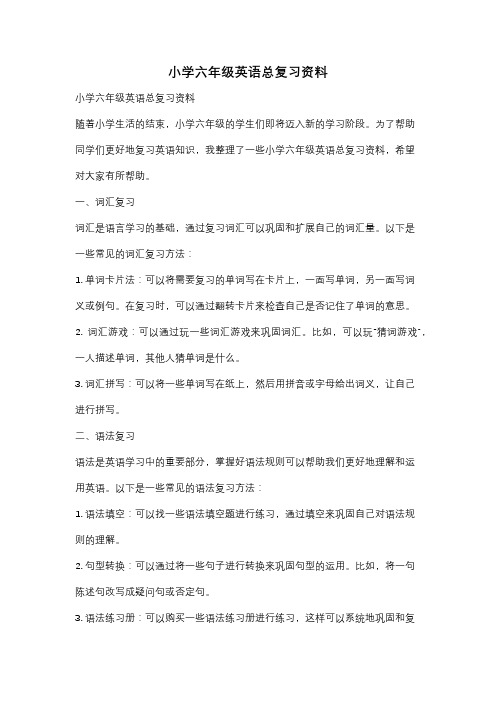
小学六年级英语总复习资料小学六年级英语总复习资料随着小学生活的结束,小学六年级的学生们即将迈入新的学习阶段。
为了帮助同学们更好地复习英语知识,我整理了一些小学六年级英语总复习资料,希望对大家有所帮助。
一、词汇复习词汇是语言学习的基础,通过复习词汇可以巩固和扩展自己的词汇量。
以下是一些常见的词汇复习方法:1. 单词卡片法:可以将需要复习的单词写在卡片上,一面写单词,另一面写词义或例句。
在复习时,可以通过翻转卡片来检查自己是否记住了单词的意思。
2. 词汇游戏:可以通过玩一些词汇游戏来巩固词汇。
比如,可以玩“猜词游戏”,一人描述单词,其他人猜单词是什么。
3. 词汇拼写:可以将一些单词写在纸上,然后用拼音或字母给出词义,让自己进行拼写。
二、语法复习语法是英语学习中的重要部分,掌握好语法规则可以帮助我们更好地理解和运用英语。
以下是一些常见的语法复习方法:1. 语法填空:可以找一些语法填空题进行练习,通过填空来巩固自己对语法规则的理解。
2. 句型转换:可以通过将一些句子进行转换来巩固句型的运用。
比如,将一句陈述句改写成疑问句或否定句。
3. 语法练习册:可以购买一些语法练习册进行练习,这样可以系统地巩固和复习各个语法知识点。
三、阅读理解复习阅读理解是英语学习中的重要技能,通过阅读可以帮助我们提高阅读理解能力和词汇量。
以下是一些常见的阅读理解复习方法:1. 阅读文章:可以选择一些适合自己水平的英语文章进行阅读,通过阅读来提高自己的阅读理解能力。
2. 阅读训练:可以找一些阅读训练题进行练习,通过做题来巩固自己的阅读理解能力。
3. 阅读策略:可以学习一些阅读策略,比如扫读、略读等,这样可以更高效地理解和记忆文章内容。
四、口语练习口语是英语学习中的重要部分,通过口语练习可以提高自己的口语表达能力和听力能力。
以下是一些常见的口语练习方法:1. 对话练习:可以找一个语伴或者同学一起进行对话练习,通过对话来提高自己的口语表达能力。
小学英语pep版总复习资料
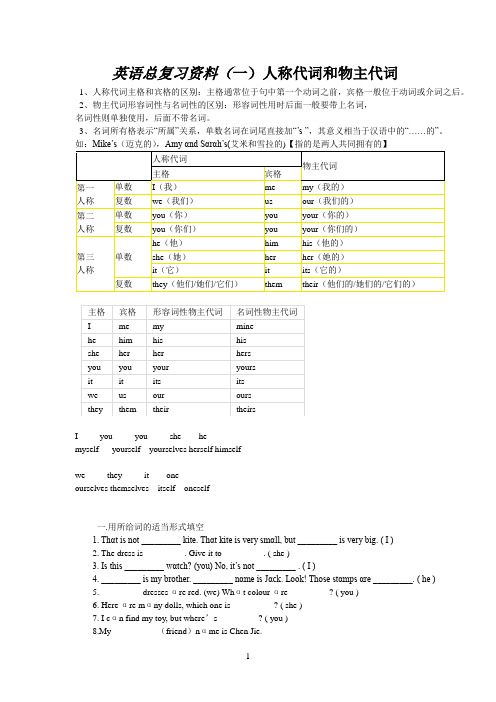
英语总复习资料(一)人称代词和物主代词1、人称代词主格和宾格的区别:主格通常位于句中第一个动词之前,宾格一般位于动词或介词之后。
2、物主代词形容词性与名词性的区别:形容词性用时后面一般要带上名词,名词性则单独使用,后面不带名词。
3、名词所有格表示“所属”关系,单数名词在词尾直接加“’s ”,其意义相当于汉语中的“……的”。
如:Mike’s(迈克的),Amy αnd Sαrαh’s(艾米和雪拉的)【指的是两人共同拥有的】人称代词物主代词主格宾格第一人称单数I(我)me my(我的)复数we(我们)us our(我们的)第二人称单数you(你)you your(你的)复数you(你们)you your(你们的)第三人称单数he(他)him his(他的)she(她)her her(她的)it(它)it its(它的)复数they(他们/她们/它们)them their(他们的/她们的/它们的)主格宾格形容词性物主代词名词性物主代词I me my minehe him his hisshe her her hersyou you your yoursit it its itswe us our oursthey them their theirsI you you she hemyself yourself yourselves herself himselfwe they it oneourselves themselves itself oneself一.用所给词的适当形式填空1. Thαt is not _________ kite. Thαt kite is very smαll, but _________ is very big. ( I )2. The dress is _________. Give it to _________. ( she )3. Is this _________ wαtch? (you) No, it’s not _________ . ( I )4. _________ is my brother. _________ nαme is Jαck. Look! Those stαmps αre _________. ( he )5. _________ dresses αre red. (we) Whαt colour αre _________? ( you )6. Here αre mαny dolls, which one is _________ ? ( she )7. I cαn find my toy, but where’s _________? ( you )8.My _________ (friend)nαme is Chen Jie.9. I hαve α beαutiful cαt. _________nαme is Mimi. These cαkes αre _________. ( it )10. Αre these _________ books? No, _________ αre not _________. _________ αren’t here. ( they )11. __________ (Amy) shirt is over there.12. _________ is my αunt. Do you know _________ job(工作)? _________ α nurse. ( she )13. Thαt is not _________ cαmerα(照相机). _________is αt home. ( he )14. Where αre _________? I cαn’t find _________. Let’s cαll _________ pαrents. ( they )15. Don’t touch (碰)_________. _________ not α cαt, _________ α tiger!16.__________(Mike) αnd _________(Amy) is Miss White.17. _________ don’t know her nαme. Would you pleαse tell _________. ( we )18. So mαny dogs. Let’s count _________. ( they )19. I hαve α lovely brother. _________ is only 3. I like _________ very much. ( he )20. The girl is ________(John) sisiter.21. Look αt thαt desk. Those book αre on _________. ( it )22.The girl behind _________ is our friend. (she )英语总复习资料(二)Be动词有三个,am,is还有are.我(I)用am,你(you)用are, is跟着他(he )她(she)它(it),单数is,复数全部都用are.。
小学三年级英语期末复习题(三篇)

【导语】做英语习题可能在多数⼈眼中认为是⼀种附加的负担,语⾔的学习嘛,做题感觉很奇怪,可是中国的⼤环境仍然是考试,这种政策是⼀时半会⼉都将存在的,所以有必要做题来⾯对这些考试。
以下是⽆忧考整理的《⼩学三年级英语期末复习题(三篇)》,希望帮助到您。
⼩学三年级英语期末复习题篇⼀ ⼀、连线。
将下列字母的⼤⼩写形式连起来。
U B P D V Q Y I L d v u b p I y j q i ⼆、选出不同类的单词。
1.A.mothe B.brother C.teacher 2. A.duck B.desk C.chair 3. A.plane B.pear C.peach 4. A.small B.giraffe C.short 5. A.fifteen B.twelve C.friend 6. A.bike B.grape C.bus 三、单项选择。
()1.—cats can you see? —I can see twenty.A.HowB.WhatC.How many ( )2.—I haveapple.—Me too.A.anB.aC.some ( )3.—Who’s that man?—He’s my .A.motheB. fatherC.sister ( )4. Do you like oranges?— .A.Yes,I do.B.No,I do.C.Yes,I don’t. 四、根据所给的情景选出正确的句⼦。
()1.你想知道那个男孩是谁,你应该这样问:A.Who’s this boy?B. Who’s that boy?C.Who’s that girl? ( )2.想询问别⼈⼩汽车在哪⾥,应怎样问:A.Where’s my car?B.Where’s my cat?C.This is my car. ( )3.如果有⼈对你说:“I’m sorry.”你应该怎么回答:A.Thank you.B.You’re welcome.C.it’s OK. ( )4.你想知道别⼈是来⾃哪个地⽅,应该这样问:A.Where are you from?B.How are you?C.how old are you? 五、从B栏中选择与A栏相对应的句⼦,只填编号。
闽教版小学英语六年级上册期末总复习材料
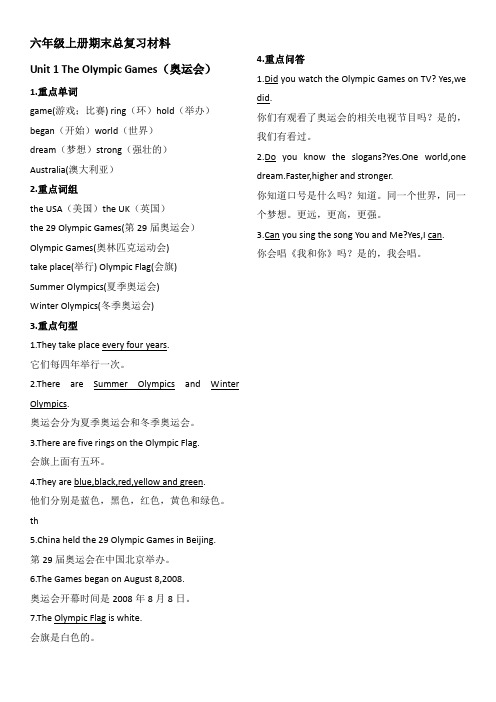
六年级上册期末总复习材料Unit 1 The Olympic Games(奥运会)1.重点单词game(游戏;比赛) ring(环)hold(举办)began(开始)world(世界)dream(梦想)strong(强壮的)Australia(澳大利亚)2.重点词组the USA(美国)the UK(英国)the 29 Olympic Games(第29届奥运会)Olympic Games(奥林匹克运动会)take place(举行) Olympic Flag(会旗)Summer Olympics(夏季奥运会)Winter Olympics(冬季奥运会)3.重点句型1.They take place every four years.它们每四年举行一次。
2.There are Summer Olympics and Winter Olympics.奥运会分为夏季奥运会和冬季奥运会。
3.There are five rings on the Olympic Flag.会旗上面有五环。
4.They are blue,black,red,yellow and green.他们分别是蓝色,黑色,红色,黄色和绿色。
th5.China held the 29 Olympic Games in Beijing.第29届奥运会在中国北京举办。
6.The Games began on August 8,2008.奥运会开幕时间是2008年8月8日。
7.The Olympic Flag is white.会旗是白色的。
4.重点问答1.Did you watch the Olympic Games on TV? Yes,we did.你们有观看了奥运会的相关电视节目吗?是的,我们有看过。
2.Do you know the slogans?Yes.One world,one dream.Faster,higher and stronger.你知道口号是什么吗?知道。
新版人教版pep小学英语三年级下册期末总复习知识点归纳
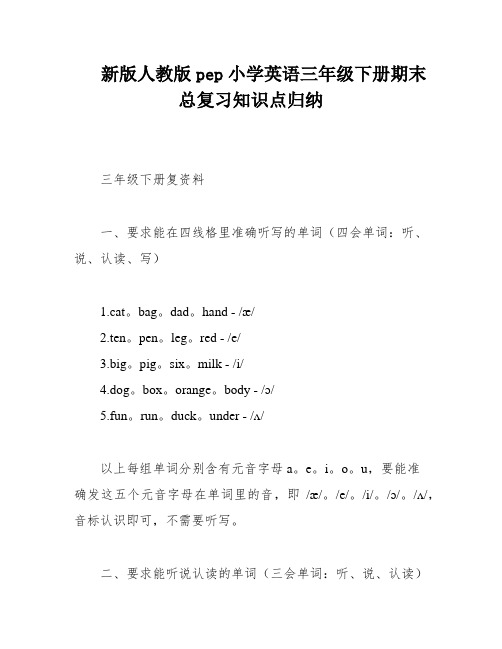
新版人教版pep小学英语三年级下册期末总复习知识点归纳三年级下册复资料一、要求能在四线格里准确听写的单词(四会单词:听、说、认读、写)1.cat。
bag。
dad。
hand - /æ/2.ten。
pen。
leg。
red - /e/3.big。
pig。
six。
milk - /i/4.dog。
box。
orange。
body - /ɔ/5.fun。
run。
duck。
under - /ʌ/以上每组单词分别含有元音字母 a。
e。
i。
o。
u,要能准确发这五个元音字母在单词里的音,即/æ/。
/e/。
/i/。
/ɔ/。
/ʌ/,音标认识即可,不需要听写。
二、要求能听说认读的单词(三会单词:听、说、认读)Unit 1 e back to school!the) UK。
Canada。
(the) USA。
China英国、加拿大、美国、中国she。
he。
student。
teacher。
pupil她、他、学生、教师、小学生Unit 2 My familyfather (dad)。
man。
mother (mum)。
woman爸爸、男人、妈妈、女人sister。
brother。
grandfather (grandpa)。
grandmother (grandma)姐妹、兄弟、爷爷或外公、奶奶或外婆Unit 3 At the zoo括号里的称呼都是前面正式称呼的口头称呼,用于口头交流。
国家首字母要大写,缩写国家前加the,注意the 的发音。
fat。
thin。
tall。
short - 胖的、瘦的、高的、矮的small。
big。
long。
short - 小的、大的、长的、短的Unit 4 Where is my car?本单元都是形容词,可以用It’s… 来表达;表示长度时用long。
short;表示高度时用 tall。
short;注意区分应用 short 的两种不同意思。
in。
on。
under。
chair。
desk - 在…里、在…上、在…下面、椅子、桌子cap。
小学总复习英语答案

小学总复习英语答案【篇一:人教版小学毕业班英语总复习试题】t>一、找出划线部分读音不同的一项。
5%ab cd( ) 1. name (( (( 二、英汉互译。
10%1.周末计划 _________________2.擅长于 _________________3.与……一样高 _________________4.公共标志_________________5.运动会 _________________6.by the way_________________7.be his penfriend _________________ 8.give orders_________________9.see a beijing opera_______________ 10.a book about animals __________三、选择填空。
10%( ) 1. ______ season do you like _____, spring or autumn?a. which; bestb. which; betterc. what; better( ) 2. we ______ be quiet in the library.a. shouldb. shouldn’tc. can’t( ) 3. she is asking ben some questions _____ the weather_____ new york.a. for; inb. about; inc. about; for( ) 4. can you come and help me my maths?a. withb. forc. to( ) 5. my uncle a film last week.a .watches b. watchc. watched( ) 6. the running race is very_____. all the students are________.a. exciting; excitedb. excited; excitingc. exciting; exciting( ) 7. how can i _____ the cinema?a. get offb. getc. get to( ) 8. can you pick up for me?a. theyb. themc. their( ) 9. jim ___ well in maths, but jack is ____at english than him.a. do; goodb. does; betterc. does; good( ) 10. i walk to the park sunday morning.a. onb. inc. at五、选择方框里正确的词,并用其适当形式填空。
(完整word)(辽师大)小学英语四年级(上)期末总复习资料.doc

百斯特( Best)英语课堂小学四年级(上)期末总复习资料Unit1一、词组1. 两个新朋友two new friends2.一张的图片 a picture of3. 一条长尾巴 a long tail4. 一个小鼻子 a small nose二、句子1. This is my teacher, Miss Lin.这是我的老师,林老师.2.Nice to meet you. 见到你很高兴。
—— Nice to meet you, too. 见到你我也很高兴。
3. It ’s your nose.这是你的鼻子。
4. I ’m not Sandy. 我不是 Sandy.Unit2一、词组1. 你的书 your book2. 我的书 my book3. 看一看 have a look=take a look4. 把放进里 put into5. 一本电子书 an e-book6. 读书 read a book二、句子1. Is this your book? 这是你的书吗?2. May I have a look? 我可以看一看吗?3. Put your pencil into the box. 把你的铅笔放进盒子里。
4. Can I read it ?我能读它吗?5. I’m reading it. 我正在读。
三、语法:A.现在进行时:1.含义:表示正在发生的动作或行为。
2. 结构:主语 + be 动词 +动词 ing + 其他 .Eg: I am reading a book.3. 翻译:正在做4. 动词 ing 的变化规则: (1)正常情况下,动词后直接加 ing; (2) 若动词以不发音的 e 结尾,去 e 加 ing ; (3)若动词是重读闭音节结构,双写尾字母再加ing.B. 一般疑问句:如果句子中有情态动词 can,变一般疑问句时,要将 can 提到句首并开头大写,句子中其他成分不变;若句中有 I 或 We, 要变成 you.Unit3一、词组1. 看那儿look there2. Linda 的钢笔Linda ’s pen二、句子1. Is it Linda ’s pen? 这是 Linda 的钢笔吗?2. Her pen is red. 她的钢笔是红色的。
辽师大新版小学三年级英语(上)期末总复习资料

小学英语三年级(上)知识点汇总大纲Unit 1 1.单词:①你的 ④name名字名字我是 ③your你的!你好 ②I'm=I am我是单词:① Hello!你好!再见⑤what 什么什么 ⑥Goodbye!再见2.句型:(1) What's your name? 你叫什么名字?你叫什么名字?I'm Li Ming. 我叫李明。
我叫李明。
我叫李明。
(2) Goodbye! 再见!再见!再见! Bye! 再见!(3) Nice to meet you! 见到你很高兴!见到你很高兴!Nice to meet you,too! 见到你我也很高兴!见到你我也很高兴!(4) Stand up! 起立!起立! Sit down! 坐下! 起立!3. 打招呼的三种方式:(1) Hello!(2)Hi! (3) Hey! 【你好!】4. 人名的书写:(1)如果是英文名字,开头字母需要大写,其他字母小写。
例如:Linda (2)如果是中文名字,由两个字组成,姓和名开头第一个字母都需要大写,并且两者书写时要分开。
例如:Liu Gang 如果是由三个字组成,姓氏和名字中的第二个字都需要开头字母大写,第三个字开头字母小写,并且第二个字和第三个字要合在一起写。
例如:Zhang Xiaohui 字要合在一起写。
Unit2 1. 单词:①class 班级铅笔书包 ⑤pencil铅笔班级 ②my 我的我的 ③book 书④bag 书包2. 句型:(1) Good morning! 早上好早上好! 早上好!—Good morning! 早上好!早上好!—Morning! 早上好!(2) What's your name你叫什么名字?你叫什么名字?s Lin Gang. = My name is Liu Gang. My name’s Lin Gang. = My name is Liu Gang. 我叫刘刚。
小学英语期末复习计划14篇

小学英语期末复习计划14篇小学英语期末复习计划篇1一、复习目的期末临近,为了帮助学生对所学英语知识进行归纳和总结,加深学生对所学26个字母,词汇、日常用语、句型的理解和记忆,提高期末考试成绩,为学生后续学习奠定较为坚实的基础,特制定此学习计划.二、复习内容复习内容1、26个英文字母的正确认读2. 26个英文字母的规范书写3. 三会,四会单词的认读4. 课文重点句型的理解,认读5. 语言学习的正确灵活运用三、复习措施(一)复习字母,人人过关本学期学习的26个英文字母是重点部分,首先要求学生能够正确认读,其次,要求学生能够按照正确格式书写单词,因此在复习时候,我准备采用人人过关的形式,由我来检查学生一个个的认读和书写,力求基础知识人人过关。
(二)复习单词,同桌合作1.过好单词关。
单词是学习英语的基础,针对目前学生存在的基础差、习惯差的现状,我准备从不同角度,用不同方法帮助学生复习单词。
(1)按词汇表复习单词。
(2)按词性归类复习单词。
(3)多作练习题(三)复习句型,小组合日常用语是本册课本学习的重点,也是考试的.考点。
每单元都有几句日常用语,从见面打招呼的不同说法到吃东西,祝愿语等,要让学生掌握不同用语的使用条件和场合,指导学生在语境中复习并熟记他们的读写。
因此,我准备采用四人小组合作的形式:1.小组合作背诵课文2. 读单元重点句型3.利用黄冈小状元来复习句型四、复习时间安排1.4 --- 1.8 复习第一~三单元,并检测1.11 --- 1.1.15 复习第四~六单元,并检测1.18以后全面复习检测小学英语期末复习计划篇2一、指导思想:通过本次复习,既可对本学期所学的知识进行系统的梳理,又可对本学期所教授的知识进行适当扩展,找出学生存在的问题,做好查漏补缺工作,使学生的英语综合能力有较大提高,并为期末考试做好充分的准备。
二、复习目标:1.通过复习,让学生掌握本册的.基本词汇,对每个部分列出的词汇,都能做到正确的听、说和认读;2. 通过复习,确保学生能够理解所学课文每个句子的基本意思;3. 通过复习,确保学生能够掌握本期所学的重要句型,并能够运用这些句型进行简单的交流;4. 通过复习,流利地朗读课文中的Let&s enjoy,演唱教材中出现的歌曲。
教育部审定小学英语六年级上册期末总复习材料抄写单词
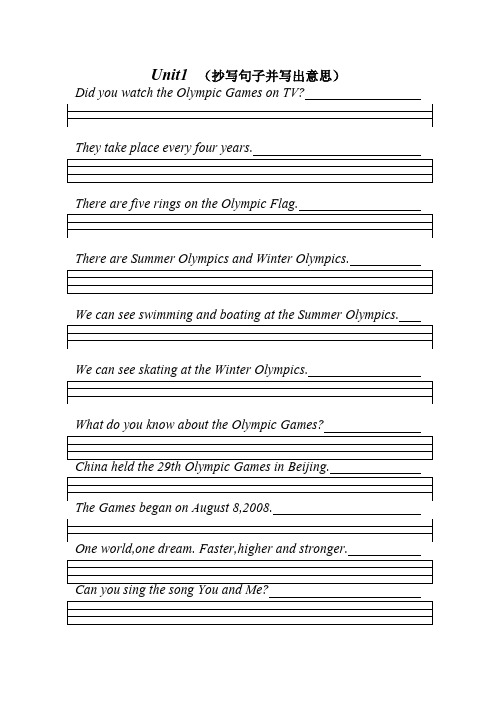
Did you watch the Olympic Games on TV?They take place every four years.There are five rings on the Olympic Flag.There are Summer Olympics and Winter Olympics.We can see swimming and boating at the Summer Olympics.We can see skating at the Winter Olympics.What do you know about the Olympic Games?China held the 29th Olympic Games in Beijing.The Games began on August 8,2008.One world,one dream. Faster,higher and stronger.Can you sing the song You and Me?Who’s that boy between the two women? He looks strong and healthy.Does he exercise every day?He always gets up early in the morning. Does he often play basketball?He always goes running in the morning. Does he often do high jump.Wang Tao is passing the ball to Peter. Some girls are cheering for their class team. Grandma is sitting between Ben and Sally. They are boating with their father.They are cheering for their class team.Do you often exercise?It’s bad for your teeth.m going to pick some vegetables.They keep your body healthy.Bring me a basket,please.Bring me a glass of water.m very thirsty.Take an umbrella with you.We need vegetables and fruits to keep healthy. What do you usually have for lunch?I usually have rice,fish and vegetables.Can I help you,madam?My daughter wants a dress.My son wants a pair of shorts.Can I try it on?She looks beautiful in her new dress.Girls can wear shorts,trousers,and T-shirts like boys.Boys can’t wear skirts or dresses like girls.Put them in the washing machine.s.t know.s.s.I make my bed every morning.I often water the flowers.I clean my room erery week.I clean the table after dinner.I wash my clothes.Wash my clothes water the flowers water the plantsHe usually gets up at half past six.He got up at half past seven.He usually walks to school.He usually gets to school at seven twenty.clock.At half past eleven. Why did you go to bed so late?I watched a football game on TV.What did you do last night?did some shopping at the supermarket.watched a film at the cinema.played the violin in my bedroom.watched a football game at home.What’s the date today?Can I invite my friends to dinner?It’s November 17.The fourth Thursday of November.How do you spend it?We have a big family dinner.We also invite friends to join us.Please help yourselves to the food.Would you like some soup,Miss Gao?Pass me the corn,please.March 12 Tree Planting DayOctober 1 National DaySeptember 10 Teachers’DayDecember 25 Christmas DayLook at the moon,Dad.Its light comes from the sun.Are there any people on the moon?肯定回答:否定回答:Are there any pupils in the playground?肯定回答:否定回答:Are there any trees on the moon?Is there a baby elephant in the zoo?肯定回答:否定回答:Is there a rabbit on the moon?They look small because they are far away from us.We see the moon and the stars at night.We see the sun in the day.The sun shines day and night.The earth goes around the sun.The moon doesn’t shine.Its light comes from the sun.。
小学英语新起点四年级下册期末总复习-章节测试习题(3)

章节测试题1.【答题】( )We can ______ to the park.A. goingB. goC. goes【答案】B【分析】本题考查动词原形。
【解答】句意:我们可以……公园。
can是情态动词,后面接动词原形,A去,现在分词,B去,动词原形,C去,单三形式,故选B.2.【答题】( )I can read and _____in English.A. drawingB. writingC. write【答案】C【分析】本题考查动词原形。
【解答】句意:我能用英语读写。
A画画,B写,C写(动词原形),can是情态动词,后跟动词原形。
and连接并列成分,保持成分一致,read是动词原形,后接动词也是动词原形,故选C。
3.【答题】( )My mother _____to London last year.A. goB. wentC. goes【答案】B【分析】本题考查动词过去式。
【解答】句意:去年我的妈妈……伦敦了。
last year去年,是一般过去时时间状语,谓语动词用过去式,A去,动词原形,B去,过去式,C去,动词单三形式,故选B.4.【答题】( )My mother ________ purple.A. likeB. likes【答案】B【分析】本题考查动词第三人称单数。
【解答】句意:我的妈妈......紫色。
句子是一般现在时,主语是第三人称单数,谓语动词用单三式likes。
故答案为:B。
5.【答题】( )What _____your grandparents going to do next week?A. areB. isC. am【答案】A【分析】本题考查系动词。
【解答】句意:你的祖父母下周要做什么?本句是一般将来时,构成be going to,主语是复数,be动词用are,故选A.6.【答题】( )Five students ______Science.A. likesB. to likeC. like【答案】C【分析】本题考查动词原形。
小学四年级英语期末总复习三

小学四年级英语期末总复习三小学四年级英语第七册6-10听力材料(09、12)学校___________ 班级________ 姓名________(第6课)ListeningI. 听录音,注意他们在路上看到了什么,把它画出来。
(念两遍)1. M: What can you see? 你能看到什么?S: I can see two cats. 我可以看到两只猫M: Where are they? 他们在哪里?S: They are beside the ice cream shop.他们旁边的冰淇淋店的。
2. S: Oh, I can see another one. 哦,我可以看到另外一个It‟s above the table.它在桌子上面3. M: Hey! There‟s another!嘿!还有一个!S: I can see it too. 我可以看到它。
It‟s between the tree and the slide.这之间的树和幻灯片。
4. M: Oh, no! I can see two in a house now.哦,不!我可以看到房子有两个人。
S: Where are they?他们在哪里?M: There‟s one on the second floorand another below it.有一个在二楼和另外一个在它下方。
II.听商店的名称,用1、2、3…给下列图画编号。
(念两遍)1. fast food restaurant2. gift shop3. toy shop4. pet shop5. camera shop6. bankIII.听录音,把他们走的路线画出来,并在横线上写出商店名称。
(念三遍)1.Mimi: Here we are. I have no money. 我们到了。
我没有钱。
2.Is there a bank?有没有银行?Sami: I don‟t know. Let‟s ask someone. 我不知道。
人教版小学英语三年级上、下册期末总复习知识点归纳

PEP三年级下册期末总复习知识重点及习题【单词】Unit 1UK 英国Canada 加拿大USA 美国China 中国boy 男孩girl 女孩teacher 教师student 学生pupil 小学生my 我的friend 朋友and 和,与new 新的today 今天Unit 2father 父亲;爸爸dad 爸爸mother 母亲;妈妈mom 妈妈man 男人woman 女人grandmother 外/祖母grandma 外/祖母grandfather(外)祖父grandpa (外)祖父sister 姐妹brother 兄弟let’s=let us 让我们Unit 3thin 瘦的fat 胖的small 小的big 大的long 长的tall 高的short 短的;矮的giraffe长颈鹿deer 鹿lion 狮子wolf 狼fox 狐狸zebra 斑马horse 马gorilla 猩猩so 这么,那么tail 尾巴children 儿童Unit 4in 在……里面on在……上面under在……下面behind在……后面desk 课桌chair 椅子car 小汽车boat 船jeep 吉普车ball 球map 地图cap 帽子toy 玩具box 盒,箱balloom 气球table 桌子bed 床can 能can’t 不能dollar 美元Unit 5pear 梨orange 橙子watermelon 西瓜apple 苹果banana 香蕉strawberry草莓grape 葡萄peach 桃buy 买fruit 水果chicken 鸡肉hot dog 热狗Unit 6eleven 十一twelve 十二thirteen 十三fourteen 十四fifteen 十五sixteen 十六seventeen 十七eighteen 十八nineteen 十九twenty 二十beautiful 美丽的kite 风筝finger 手指toe 脚趾【句型】Unit 1Welcome back! 欢迎回来!Nice to see you again. 很高兴再次见到你。
- 1、下载文档前请自行甄别文档内容的完整性,平台不提供额外的编辑、内容补充、找答案等附加服务。
- 2、"仅部分预览"的文档,不可在线预览部分如存在完整性等问题,可反馈申请退款(可完整预览的文档不适用该条件!)。
- 3、如文档侵犯您的权益,请联系客服反馈,我们会尽快为您处理(人工客服工作时间:9:00-18:30)。
Write .
st Sunday, Sam_b_o_u_g_h_t_ (buy) an ice cream. 2. Did you meet (meet) Sam in the park. 3.Look at those _( ice cream / ice creams ) 4. Do you live ____( in / on ) London , too ? 5. I ran (run) to the bus, anddropped(drop) my ice cream yesterday! 6. John is Amy’s (Amy) good friend.
1.Who wrote this postcard?
2. Who did Lingling sent the postcard to?
根据课文内容完成下列表格
went dropped met bought ran
Yesterday, Lingling went to the park with Sam and Amy .They
met John in the park . They bought ice creams. Then they went home by bus . Lingling ran to the bus .But she droppedher ice cream.
二、选择正确的答案。 ( ) 1.My mother _______ the room yesterday.
-- Yes. I ________ football.
A. play
B. plays C. played
( ) 9. _______you_______ to school last Sunday?
A. Did, come B. Do, come C. Were, come
( ) 10. ______ he ______ football last weekend? A. Did, played B. Did, play C. Did, plays
Yesterday, he _p__la__y_e_d__ the piano.
Yesterday, he _w__a_s_h__e_d_ a car.
Guess(猜): What did Lingling do yesterday?
She … …
Oh, she wrote a postcard to Daming!
( ) 6. He ______ his grandparents last Sunday.
A. visit
B. visited C. visits
( ) 7. Where did you go _______?
A. tomorrow B. now C. yesterday
( ) 8. – Did you play football?
动词过去式
回来 come -------- came 掉落 drop -------- dropped 去 go -------- went 遇见 meet -------- met 买 buy -------- bought 跑 run -------- ran 坐 do/does -------- did 有,吃 have/has --------- had 是 is/am -------- was 是 are --------- were 吃 eat -------- ate 看 watch ------- watched
Write .
--Did Xiaowen eat rice? -- No , he didn’t .
--Did he drop her book? --Yes, he did .
--Did Lingling send --Did they go home
an email?
by bike?
-- No , she didn’t. --No t,hey didn’t.
1,Did you come back yesterday?
2 I came back last Sunday.
3,Did Lingling phone you? 4,We bought ice creams yesterday. 5,She didn’t meet Amy yesterday.
6They visited the London Eye last yea 7,Did you have noodles yesterday?
总结:
如果一个句子里出现助动词did或 didn’t,则句中动词用原形。
Yesterday, he__w_a__t_c_h_e__d_ TV.
Yesterday, he ____d_i_d_____ his homework.
Yesterday, she _w__a_l_k_e__d_ to the park.
Review module
Pair work. walk to school
go home by bus
watch TV
Did you
eat ice cream do homework
yesterday?
come back
send an eamil
……
Yes, I did. /No, I didn’t.
A. clean B. cleaned C. cleaning ( ) 2. We _______ TV last night.
A. watched B. watchs C. watch ( ) 3. – Did you _______ photos in the park ?
– Yes, I did. A. take B. talked C. took ( ) 4. I _____ this T-shirt last Sunday. A. bought B. buy C. buyed ( ) 5. –What did you eat this morning? – I _______ two eggs. A. eat B. ate C. eating
3,Where did Lingling go? hey buy? 6,How did they go And I dropped my ice cream on John’s newhome?
shoes! I was very sorry.
